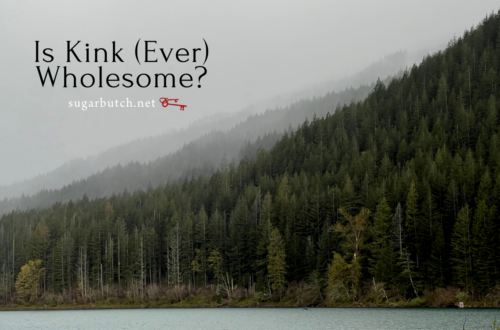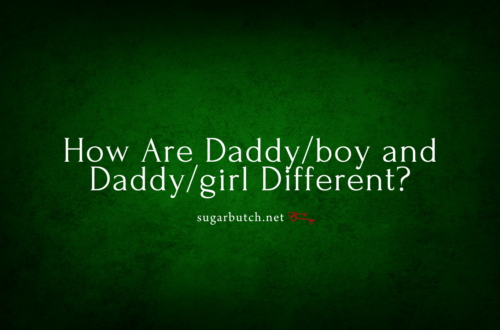Seems like I kinda stepped in it with this entire intentional gender thing! Lots of comments and emails about that one.
(Almost as bad as I stepped in it when I suggested something like “I noticed your gender from across the room” as a pickup line. Yes, it sounds ridiculous. But there’s just no other way to say that without a) objectifying, and potentially offending or b) assuming a person’s gender and potentially offending. Though perhaps that’s speaking more to my underlying Issue of not wanting to offend people than it is speaking to getting someone’s attention by using gender as a flirtation device. Maybe the more appropriate line for most folks is just, “hey, I think you’re hot.”)
I think the mention of “unconscious” vs “conscious” gender are more accurate descriptors than “intentional” vs “natural” gender. I’ve already mentioned this, but: modern gender theory does not believe gender is “natural” at all, it says gender is socially constructed. It can be constructed consciously, or it can be constructed unconsciously.
But there are ways that I can be more conscious about the ways I carry myself. There are ways that I can study and understand how gender works in this highly, highly gendered society, and figure out and choose the ways I operate within it.
So, here’s a bit of a story about what that process looked like for me:
I was raised in a very feminist household. The rejection of traditional gender roles was instilled in me from very young, by my mother especially, who didn’t take my father’s name, never shaves, never wears makeup or dresses or skirts or heels, was primarily the one to mow the lawn and help me with my math homework, etc.
Though this was deep within my family values, I was particularly susceptible to cultural standards as a teenager (I think we all are, and I have some ideas about why I was in particular, but I won’t go into that here), and I ended up fairly gender-conformist, nearly married – to a cisgendered guy – for five years. I think I had to prove that for me, the model of grown-up relationships really wouldn’t work, that all that society says is actually untrue. Of course, for some people it works just fine to be female-bodied, feminine, and attracted to men – clearly, not so much for me. I think it was precisely because I suspected that this wasn’t true that I had to really prove it for myself.
I’m also firmly based in second wave feminism insofar as I believe every person’s unique life experience is valid and important. I believe each of us is already an expert on our own gender, our own lives. I believe we all have valuable, thoughtful things to add to the conversation of gender (or sexuality, or relationships) regardless of our supposed credentials or expertise or level of study.
That’s the thing about gender – we all have it, we all live in a particularly gendered society, we all have been raised with its influence.
Consciousness-raising groups (in my understanding) started for because there was no formal study of women or the female experience. (I can’t really even imagine a culture that assumed that women’s experiences were included in the male norm, a culture that had no feminist cannon, such a lack of sources to study and know and experience. Thanks, foremothers, for women studies, for feminist studies, for all the work you did!)
So C-R groups created their own sources, using the experiences of the women in the group themselves, treating each like a text, a source, from which they could learn, from which understanding could arise and blossom and grow.
This is how I see this writing project, this community, and all of you who participate and who engage with me – as part of a large consciousness-raising group, where we are all sharing ideas, resources, and experiences to gain greater understanding of our selves, our communities, and the world as a whole.
This too is where my love for narrative fiction overlaps, where reading someone else’s story enhances my understanding of the world, where I feel less separate and more connected and, ultimately, where every story has value, especially the voices to marginalized communities, experiences, bodies, and lives.
So: growing up in a feminist household with rejection of gender roles, then going out into the world and living in a hetero relationship where we were playing out very stereotypical gender roles, then coming out as queer – all this lead me to start studying feminist, queer, and gender theory, seeking out language, concepts, and similar stories to help me explain my own experiences. And within gender theory and studies, I finally found places to get some of my questions – gender roles, gender compulsivity, gender norms, gender within relationships, the intersection of sex & gender – articulated, and then answered.
Such as:
What is gender?
How does it work?
Why are we confined to a binary? Why don’t we have three or eight or fifteen genders?
How does the sex/gender binary function?
What purpose does it serve?
Who benefits? Why, how?
How does it get enforced?
How has it changed over the years?
How is it connected with race, class, sexuality, nationality, religion, etc etc?
And once I started getting ideas about how to answer these questions, I started asking more personal questions of myself, and where I fit in to this huge, permeating, practically invisible system of hierarchy, power, and value.
Such as:
How do I feel comfortable?
What makes me feel powerful?
How do I want my hair?
What looks good on my particular body?
What fits with the way I carry myself, how I treat others, how I see myself?
What type of gender am I attracted to?
How does this relate to my sexuality?
I was simultaneously starting to come into my own as butch, partly because of the lesbian initiation process of rejecting femininity and cutting off your hair (which worked for me, though certainly doesn’t work for all lesbians who go through this), and partly because I started immediately liking femmes who dated butches and who recognized a sort of masculine ‘energy’ in me.
Actually claiming the label and identity category of butch was a more difficult quest for me, one I’ve written about a few times, specifically in terms of masculine posturing and rejecting – as a feminist and lesbian – the things that I see are so problematic with compulsory masculinity in both cisgendered men and in masculine-identified women. (More on that another time.)
Regardless of my questions and hesitations about butch/femme roles and labels, the process was definitely underway. And as it has unfolded deeper and deeper, in more and more aspects of my life, I have found such a home in it, in ways that have been seriously transformative to the ways that I operate in the world.
The basic feminist principles of inherent equality, the wide range of human experience, and celebrating the self as it is are applicable to many, many aspects of gender exploration. But I’ve found that these principles aren’t quite so active in most of the lesbian communities. Yes, there are people doing this work, but we are not the majority – compulsory gender in lesbian communities is usually a sort of gender rejection, an androgyny.
And that works for many people – which is excellent! I will always say you should go with what feels good to you, what makes you feel sexy, powerful, beautiful. For many of us, it is not androgyny that makes us feel good about ourselves, it’s another type of gender expression. There’s a huge gender galaxy out there, a huge range of expression and celebration, and so much to play with.
I don’t pretend that I have all the answers to questions or issues on gender. I have concepts, ideas, and resources, and I have reached some understandings, about both the world and system at large (macro) and my own personal place within it (micro).
I also don’t think my answers will necessarily be your answers.
I encourage you to find your own answers. To ask these questions, to decide consciously where you want to be within this pervasive system.
There have been many of you who have emailed me or commented about my recent writings about conscious vs unconscious gender, and here’s the part where I start to actually take an opinion on this: I think it’s very important to discover, stumble upon, find, or create a conscious gender. Doesn’t matter how you come to it, really, but it does matter to me that we do.
What that conscious gender might look like, of course, is highly varied – perhaps all it’ll take is a moment’s consideration, and a recognition that yeah, I’m where I want to be, that’s enough for me. Maybe it’ll take years of deep exploration and personal omphaloskepsis and meditation and therapy. Maybe it’ll take reading lots of books about the subject, or lots of blogs. Maybe not.
I don’t pretend to know what that process looks like for everybody, all I know is how it looks for me – and how important it has been for me to go through that process, which is, obviously, why I am encouraging it in others.
Look, I know not everybody has the interest in this that I do. And I don’t think everyone needs to start a blog (that becomes their part-time job) and dedicate a big portion of your free time to studying how gender works and what it means to you personally, but I really do think we would begin to move forward if we have some small moments of awareness about gender, about compulsive behavior and categories, about discriminating against butches or femmes or trans folks or androgyny.
When we understand (at least a little) how the system works so that we can begin to see how we fit inside it, and we can be empowered to make the choices that are in our own best interests, rather than in the best interests of those for whom this system is designed to benefit.
But it’s not just that. It’s also because when everybody does better, then everybody does better. It’s also because sometimes I’m lonely out here doing gendered work with a small handful of community. It’s also because, though some small circles of consciousness-raising activists are happening, most gender is still compulsory and not letting up anytime soon. It’s because this binary compulsory gendered system hurts us. It’s because trans and gay kids are getting beat up and murdered. It’s because boys who wear dresses are shamed. It’s because tomboys who want to run around shirtless are shamed. It’s because women are not safe walking alone on the streets of Manhattan at night. It’s because I am not safe walking alone on the streets of Manhattan at night. And we should be able to be safe, I want us to be safe, all of us.
And plus? Underneath some of the hard work here, it’s really fun. It’s dress-up, it’s activism, it’s subversion, it’s sexy. It’s a deep celebration of you, of me, of our interaction with the world, and with each other.




kudos. i've been on a gender discussion roller coaster this week, and its really nice to read your thoughts.
thanks.
[My pleasure, & thanks for saying. PS, you're the 3,000th comment! – ss]
As an anthropology grad student, I find this discussion fascinating. My focus is on how inter-intra personal communication affect the balance of power in arenas where violence has occurred/is occurring. Thank you for some interesting reading.
Sinclair, your entries about gender are always food for thought. I thinks it's great that you encourage all of us to explore these things on our own, especially or "conscious gender" as you put it.
My gender is very much a natural part of me, but I am purposely conscious of where it comes from and how it's represented by me in my day to day.
Great topic!
Much respect, have a great weekend.
-The blogger formerly known as Jero. heh.
this is a bit out of left field, perhaps, but your essay got me thinking… what about the other two elements of that holy trinity, race, class, & gender? is it possible or desirable to have a conscious race or class? and what does that look like? there's something liberating, for me, about claiming a conscious gender of female masculinity, but i'm also white and middle-class, and the idea of a celebratory, conscious whiteness and middle-classness… well, it seems a bit creepy. unless my conscious race, for example, were simply conscious antiracism and an awareness of what being white means in this racist world. is that because of my different positions on the hierarchy in each category? (would a conscious straight male gender then be mainly about anti-sexism?) or is it because of some fundamental differences between how gender works and how the other two work? (like: class mobility is desirable, race mobility is either impossible or despised, gender mobility is this whole other complicated thing.)
not expecting any answers on this from you, ss! just my own musings as i consider what this gender thing really is, and how it fits into the whole experience of being human. thanks for a thought-provoking post.
Thank you for this. Everything you write leads me to do more thinking for myself and I really value that. I am grateful for you and your work.
Woah, it's interesting what leo said about conscious race, class and gender. I've never quite given it words, but part of the conscious gender that i expect/desire in myself and my friends/lovers/etc has to do with privilege, too. because as a high femme, I do have some privilege in certain area. And my stone butch partner does, too, in different places. And I expect her to be aware of that, and aware of it's effect on others, just as i am careful of my privilege, when to use it (in a female bathroom with her) and when not to (most of the rest of the time, as much as i can control that). I also ask that white queers be aware of their race privilege, and middle and upper class queers be aware of their class privilege. And THEN (to make it more complicated) I am also aware of my combo privileges, as a white, educated, middle class, able bodied, average sized femme, because those things separately are a lot of privilege, but together….. i don't think they can even be taken apart from each other
Wow! SS and Leo, together, thanks! Tremendous thoughts on sex/gender/priveledge, and then the link to race/class- woah…
I've got another deep question to ponder and explore.
J
Amen, sister-brother brother-sister! I wish I had more time at the moment to do more than tip the brim of my baseball cap to you. But I had to say as much. Such a fascinating conversation; such a wise take on it all. Many, many thanks for your wise and thoughtful voice.